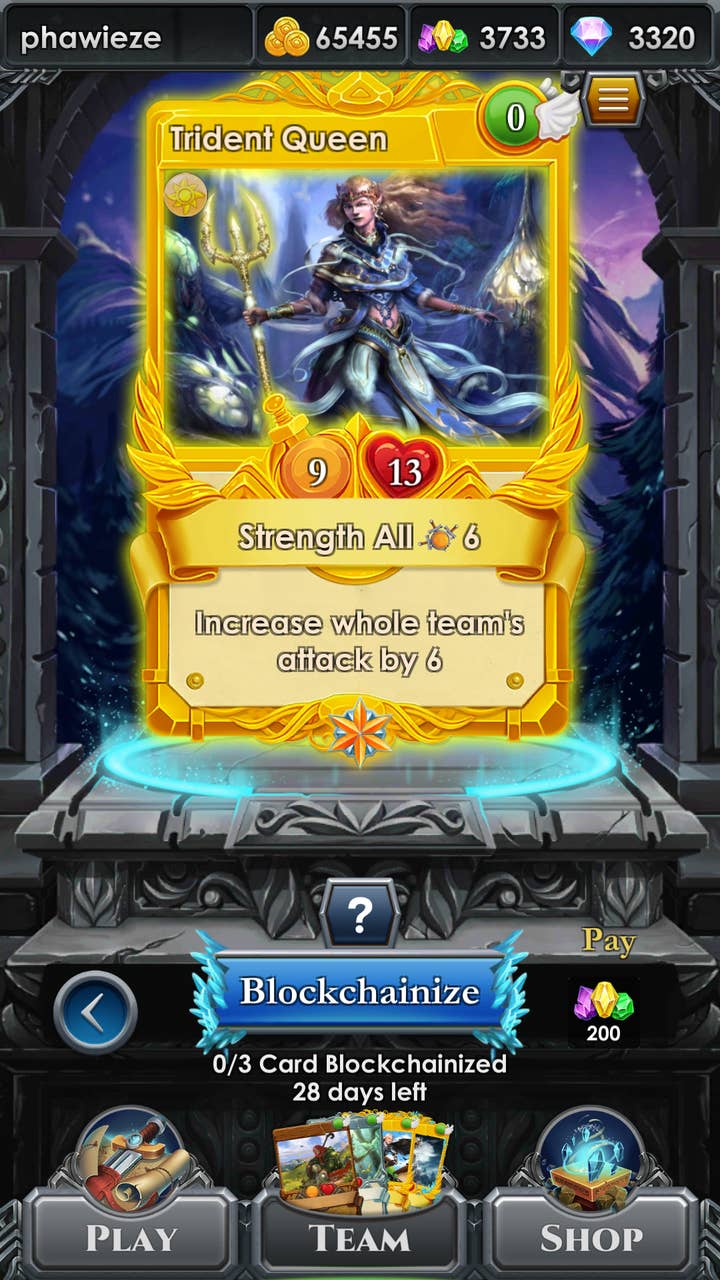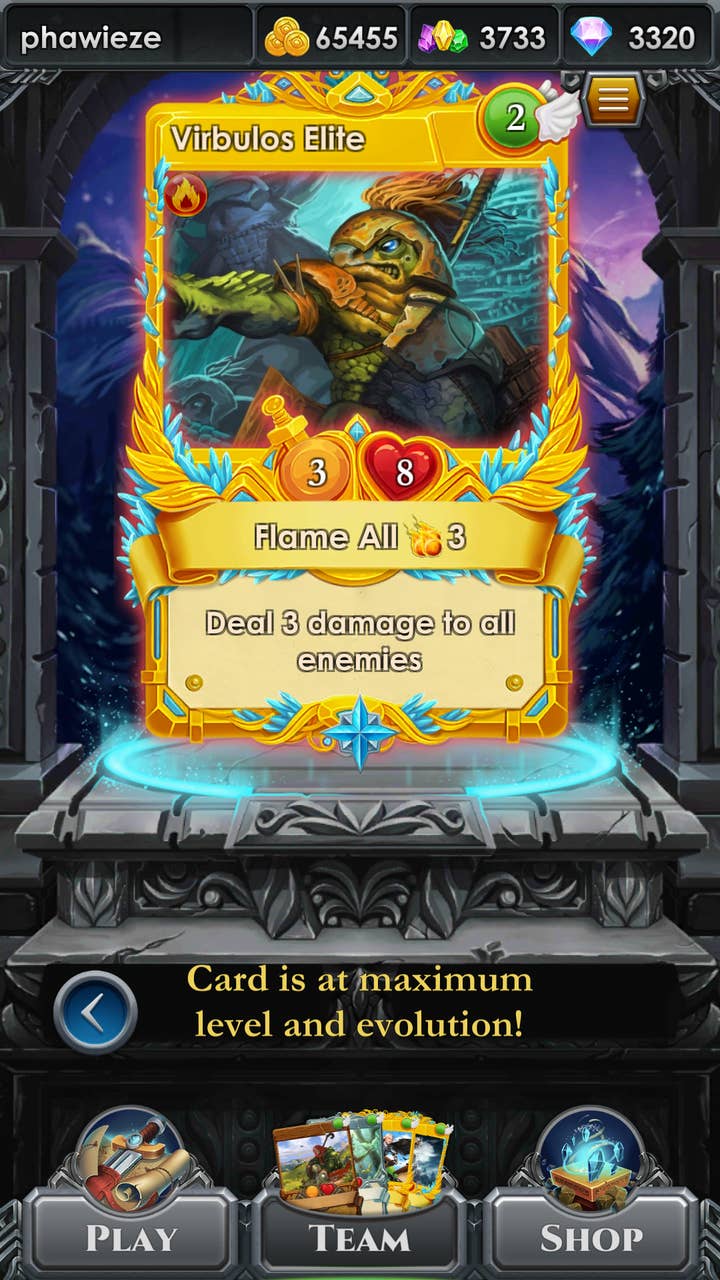"It's hard to put in words how life-changing blockchain technology will be"
EverdreamSoft plans to demonstrate the new tech's power by enabling players to sell - and more importantly own - in-game cards
You probably clicked that headline out of curiosity.
Blockchain is a word tumbling into almost every inbox on a daily basis now, regardless of whether or not the recipient understands it. It's often associated with cryptocurrencies and Initial Coin Offerings, but the true potential for the technology in video games goes far beyond this - as one mobile studio hopes to demonstrate.
EverdreamSoft has introduced the ability to 'blockchainize' in-game cards from its latest CCG Spells of Genesis. Horrific though this jargon-esque term might seem, the meaning behind it is far more intriguing.
"Consumers are spending hundreds of billions on content that gives them no real right of ownership. [But it is] are all owned and controlled by the game publisher"
Here's how it works: Once a card is fully levelled up (or, in the Spells of Genesis vernacular, "quad-fused"), players have the option to 'blockchainize' them. Essentially, this enables players to transform their cards from in-game assets to a blockchain one: a digital item that can be sold and traded in exchange for real money.
The nature of blockchain technology - whereby only one user may own or access an asset at once - prevents people from duplicating cards or committing other forms of fraud. There are 220 different cards that can be blockchainized, with more than 20,000 already purchased by players.
The act of blockchainization costs in-game currency - either crystals or gems, depending on how many cards have been converted before - and EverdreamSoft limits players to three conversions per month in order to prevent the market from being flooded. But after the cards have been transformed into a blockchain asset, players are free to sell and trade as much as they like.

"Once it is on the blockchain, it has a unique, trackable identity, which means that the player has complete control over whether to keep, trade or sell it," CEO and founder Shaban Shaame tells GamesIndustry.biz. "Essentially, blockchainization is the act of cutting the cord between the game and the asset. But that understates just what a big deal this has the potential to be."
However, the concept of players selling and trading in-game assets is nothing new. Indeed, there has long been an established marketplace for weapon skins in titles such as Counter-Strike: GO - but Shaame stresses that the key difference is "true ownership".
"The majority of digital assets in circulation are not really owned," he explains. "Consumers are spending hundreds of billions on content that gives them no real right of ownership.
"For all the money supposedly being made by skins and in-game items, they are all owned and controlled by the game publisher. These companies have the power to change the terms of service, freeze players accounts, or even just shut the whole marketplace down. The fact that they don't is because it is so lucrative, to the point that you are seeing more big publishers adding loot crates and tradeable items to their games. But for all the supposed freedom to spend extra money, players are powerless.
He continues: "Blockchain offers us the opportunity to reset the power dynamic. If I want to own a digital asset, that transaction - and all subsequent transactions if I choose to trade or sell my asset - are clearly and openly recorded. No more pages and pages of legalese that explains why the DLC or in-game item I just bought aren't actually mine."

Awareness of the lack of ownership when it comes to digital games content - ranging from skins and other in-game items to DLC packs or even entire games - is remarkably low among consumers. While they appreciate the convenience of digital assets, many will posit that since they have invested money in that content, they should have ownership of it.
This is demonstrated by people demanding refunds for DLC they have purchased in titles that have shut down, such as Marvel Heroes - and, let's be honest, how many of us read Terms and Conditions thoroughly?
"There's absolutely not enough awareness," Shaame says. "And it suits many of the games companies to keep it that way. They all retain the right to change the terms and conditions however they want, whenever they want. There may be the occasional outcry in the consumer press when there's something particularly egregious, but I think we've all just become used to the way this works. People assume there is no alternative.
"But I just don't see how this can be sustainable. Aside from what this means for a publisher's relationship with their fanbase - I'm thinking of the recent furore about EA's loot crates, or Bungie's implementation of microtransactions in Destiny 2 - digital distribution is only going to increase, and more games will rely on in-app revenues for their revenues. If nothing else, using the blockchain as a transactional platform is a far better and more transparent way to run these systems."
Interestingly, EverdreamSoft does not earn anything at all from player trades and sales in Spells of Genesis - just the sales of the in-game currency required to convert the cards in the first place. And Shaame stresses that it's still possible for users to reach the stage where they can "blockchainize" their cards without spending any money - "Assuming you have enough patience and some good luck," he adds.
This might be viewed as money left on the table, but Shaame believes the rise of blockchain-based digital assets and the subsequent player-driven market for them is "something that's inevitable and will fundamentally change the games industry"
"It's really not going too far to compare blockchain to the invention of the world wide web"
"This game is really just a first test, and we'll see where it goes," he says.
The decision to introduce blockchain-based cards that can be sold and traded at will was actually inspired by people exploiting the economy of the studio's first game, Moonga.
"We found that players were agreeing on values of particular character cards amongst themselves, and then swapping them in-game and paying in real money on the side," Shaame explains. "We discovered it because we started getting a suspicious amount of players reporting they had been 'hacked' and rare cards removed, when in fact they were selling them. Rather than penalise these players, we recognised that what they really needed was a way to do their trades that complimented the game economy. Blockchainization grew from that."
That doesn't necessarily mean the blockchain prevents any abuse of the economy. As Shaame puts it there are always "extremely clever people out there who are willing and able to exploit any point of failure in your system" but he maintains that blockchain assets are "certainly a lot more secure than anything we have had until now."
"The fact that people are doing this is down to the design of the game and what the developers are willing to turn a blind eye to," he continues. "World of Warcraft players have been grinding and selling items for years, in direct contravention of the terms and conditions of the game. All that has happened is that Blizzard decided that this is fine, as long as you use in-game currency. Ten seconds on Google will show that trading for money still goes on. It's all about what balance the games company wants to strike between fostering an active community, and unbalancing the game.

"In Spells of Genesis we've deliberately limited the amount of cards that can be blockchainized so that there is not a sudden glut of high powered cards that might unbalance the core gameplay. We've not introduced anything that is new or overpowered or that can't be done through normal gameplay. Rather, we are giving players who have invested in the game the option to get something tangible in return.
"What is the real difference between a player that will spend hours farming in a game to level up a weapon, and another that would rather pay a premium for it to be done for them? I would argue that as long as neither choice has a detrimental effect on the wider player base, it's a question of personal choice. Certainly, the cynic would say that this is no different to a game that lets players buy high-powered items as an IAP. The only difference is who the money goes to."
Shaame reiterates time and again that it is "very early days" when it comes to exploring the potential uses of blockchain, but that doesn't stop him from getting excited about its ultimate impact.
"It's really not going too far to compare this to the invention of the world wide web," he says. "That created the interconnected digital world we now live in, and blockchain has the ability to transpose the kind of ownership and control we have in the physical world onto the digital."
He continues: "The introduction of the blockchain into the equation radically challenges the way the gaming industry is going to work. Gamers and game-makers are jumping on this peer-to-peer model, not unlike what happened with Napster back in the late '90s. By allowing players to own and control their assets the publishers can still experiment with free-to-play models and IAP, but the dynamic between player and publisher becomes more equal."
Shaame expects more developers to experiment with this technology in their games. We've already seen the likes of Reality Gaming Group use blockchain-based cryptocurrencies in its upcoming mobile AR shooter Reality Clash, but there are other studios making the tech integral to how their game operates.
Spyr Games, for example, will enable players to sell, trade and own planets in its flagship title Pocket Starships, while B2Expand is letting Beyond the Void players own and sell in-game avatars and ships. Industry veteran Brian Fargo is even using the tech to create a digital games store with second-hand sales in Robot Cache.
"Undoubtedly, blockchain-based digital ownership will spread more widely," says Shaame. "Right now, creating a digital wallet account takes a few minutes on either your mobile or your browser. In the short term there's no reason why your blockchain wallet can't be part of the system software, in the same way that PSN or XBL connect to your credit or debit card account. Once you have access to a wallet, you are able to manage your assets. There is no effective limit on what the asset is - whether it's a single playing card or a whole game, it doesn't matter. You can use the blockchain to establish your purchase and ownership of it."
He continues: "Forget the speculation bubble and the obsession with the value of bitcoin, and think about what being able to own and control your digital life will mean. The blockchain is something that could underpin any sort of transaction in the future. Being able to put a value on something that until now was intangible creates an opportunity for the rights of creators and artists to be honestly and fairly rewarded. It's hard to put into words how life-changing this technology is going to be."
